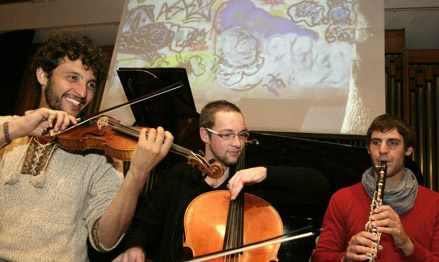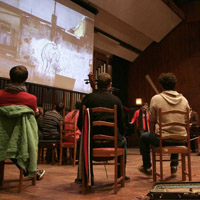Latest News Archive
Please select Category, Year, and then Month to display items
14 November 2024
|
Story André Damons
|
Photo André Damons
 Staff members from the Directorate Research Development (DRD) at the University of the Free State; Palesa Mgaga, second from right, Tebogo Machethe, centre, and Charelise van Staden, second from right, were thanked for hosting the launch of the Khoebo Innovation Promotion Programme. They are pictured with colleagues from the IDC’s Samkelisiwe Mtsewu, left, and Thato Mogopodi, far right.
Staff members from the Directorate Research Development (DRD) at the University of the Free State; Palesa Mgaga, second from right, Tebogo Machethe, centre, and Charelise van Staden, second from right, were thanked for hosting the launch of the Khoebo Innovation Promotion Programme. They are pictured with colleagues from the IDC’s Samkelisiwe Mtsewu, left, and Thato Mogopodi, far right.
The University of the Free State (UFS), represented by the Directorate Research Development (DRD), played host to the Department of Trade Industry and Competition (dtic) and the Industrial Development Corporation (IDC) for the launch of its Khoebo Innovation Promotion Programme (KIPP).
The launch took place on 5 November in the Sasol Library on the Bloemfontein Campus. Tebogo Machethe, Director: Research Contracts and Innovation at the DRD, said its role was to expose the university researchers to different opportunities and programmes for funding from the IDC and the dtic. It also allowed the researchers to engage potential funders in order to understand what funders look for in a project when considering funding it.
“The aim of IDC KIPP is to assist local entrepreneurs and small to medium enterprises with commercialisation funding. The KIPP offers capital and business support to SMMEs during the early stages of commercialisation with particular emphasis on township and rural entrepreneurs,” said Machethe.
Address uneven distribution of economic development
KIPP is a dtic programme but is managed by the IDC and aims to enable early-stage innovative SMEs to penetrate the market with their locally developed innovations, resulting in a more competitive economic environment and thereby facilitating economic growth in the economy.
According to Machethe, who welcomed the guests, participants and presenters to the launch, some of the funding is geared towards the development of university innovations. Though the focus was on the KIPP launch, he continued, the discussions also encompassed other forms of funding that are available and more geared towards the university innovation.
His address was centred around the university's Vision 130 and how it supports innovation and the entire innovation ecosystem, which seeks to shift the emphasis to research impact, embracing both knowledge and societal impact. Vision 130 identifies the need for a greater focus on collaborative research, research that can attract large-scale funding in niche areas where the university is seen as a national and global leader.
Samkelisiwe Mtsewu, KIPP Account Manager at the IDC, said the programme was introduced to address the uneven distribution of economic development across the country. She said with its capacity, the KIPP programme can contribute to addressing the uneven distribution of economic development.
‘Celebrating the music of our times’
2013-07-25
|
 |
| 25 July 2013 |
The Odeion School of Music’s (OSM) New Music Week, hosted from 17–20 July 2013, offered an experience of profundity.
This was the second week-long festival of its kind to be hosted by the OSM – last year the 90th birthday of the South African composer, Stefans Grové, was celebrated with concerts and a symposium. This year the New Music Week focused on the visit of Ensemble Trans-Z under the artistic leadership of former OSM student, Alfred Vorster, a composer living in Zürich. The Order of the Odeion School of Music was bestowed upon Vorster during the festival. The members of the ensemble are the Belgian pianist Lukas Huisman, Danré Strydom (currently an OSM doctoral student in clarinet, based in Ghent), the Argentinian violinist Juan Braceras and the Swedish cellist Karolina Öhman (both currently living in Basel, Switzerland).
The week included three lectures. Lukas Huisman elucidated his doctoral project, Alfred Vorster offered an analytical perspective on the work of Helmut Lachenmann and Hannes Taljaard (Potchefstroom) delivered a commentary on his own composition practice. In addition to presenting masters’ classes in their individual instruments, Ensemble Trans-Z also hosted two workshops – one for the Mangaung String Project and another for OSM students and staff. These workshops focused on creative improvisation practices within an avant-garde style.
composition practice. In addition to presenting masters’ classes in their individual instruments, Ensemble Trans-Z also hosted two workshops – one for the Mangaung String Project and another for OSM students and staff. These workshops focused on creative improvisation practices within an avant-garde style.
The highlight of the festival was two gala concerts that were held on 19 and 20 July. The first concert was hosted by Ensemble Trans-Z themselves, with a selection of compositions in the avant-garde style. The programme included challenging listening material and was creatively presented with unconventional lighting techniques and visual material.
The concert on 20 July consisted of New Music of a more conventional nature. The Odeion String Quartet offered a varied presentation which consisted of a rich mix of talent. OSM postgraduate students Marianne Cilliers, Karol Legierski and Eljee du Plooy formed part of this spectacular performance. The OSM flute lecturer, Handri Loots and the members of Ensemble Trans-Z supplied additional depth to the concert. The experience was made extra special by the recently-formed New Music Ensemble of the School of Music at the North-West University – led by Augusto Arias. Under conductorship of Jan-Moritz Onken, the OSM Camerata completed this impressive collaboration.
The Camerata’s recital of Hendrik Hofmeyr’s Phantom Waltz, which the composer newly arranged especially for this ensemble, was but one of the artistic highlights of an inspiring presentation.